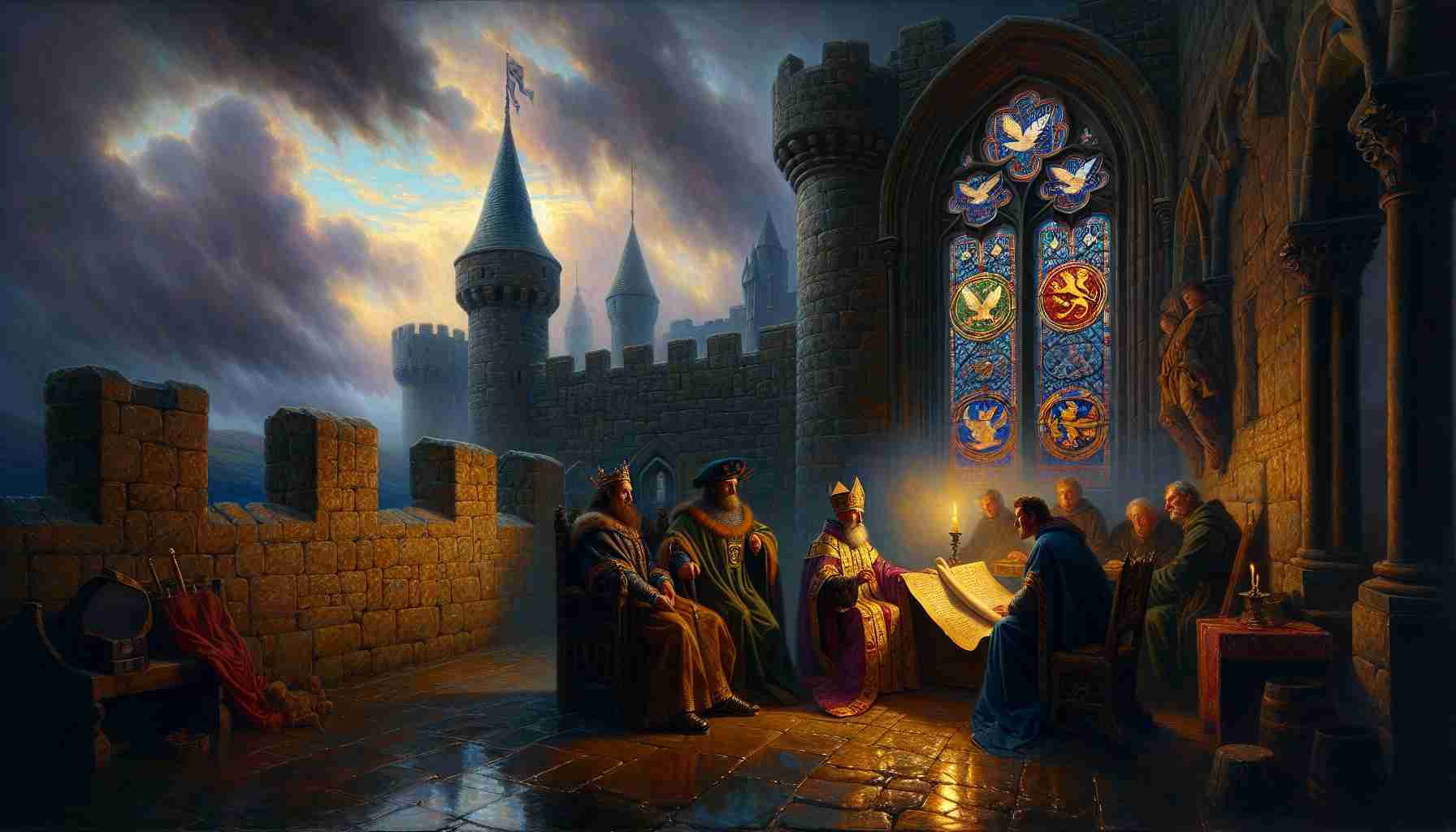

The chill of a Highland summer morning curled its fingers around Stirling Castle, where whispers of war clung to gray stone walls. Wind swept in from the north, ruffling the standards mounted along the battlements—Scotland’s lion rampart still defiant. Inside the great hall, beneath the flickering torchlight, King John Balliol stood in solemn council, a parchment heavy with ink and divine ambition spread before him.
It was July 5, 1295. Outside, the weary land bore scars from the iron heel of English rule. Edward Plantagenet, styled Longshanks, had pressed relentlessly into Scottish soil, his ambition unchecked by treaties or mercy. Churches had been desecrated, abbeys burned, and Scotland’s crown reduced to a token under southern command. The people cried not only for sword but salvation—something that could stitch together the torn and trembling fabric of a nation.
Balliol’s eyes, rimmed by fatigue and the weight of compromise, met those of Bishop William Lamberton. The bishop, well-versed in both scripture and politics, voiced what many feared to whisper aloud: “Ecclesiastes reminds us that though one may be overpowered, two can defend themselves. A cord of three strands is not quickly broken.”
Balliol turned toward him. “Are France, the Holy Father, and Scotland a trinity enough for such a cord?”
Lamberton gave no smile. “Faith alone binds men through fire. Let it not be cut by fear.”
That day, the treaty was sealed. The wax bearing the fleur-de-lis of King Philip IV of France met that of Scotland’s lion beneath the cross. A pact—Holy, they dared to claim—was born from necessity but sanctified by shared belief. Behind the ink were centuries of Catholic devotion. The Scottish church, still free from English appointment, stood tall as the nation's conscience and crown.
And in Rome, Pope Boniface VIII, though distant, extended benediction. To defy the tyrant, to protect the sanctity of a nation’s altar, was not rebellion—it was divine duty.
The alliance would come to be known as the Auld Alliance. Not a fleeting strategy, but an oath that would echo across generations, invoked not by kings alone, but by mothers at hearth’s edge teaching their children to name friend from foe.
In the glens of Argyll, a boy named Aedan watched his father ride out at dawn, bearing the sigil of both Scotland and France stitched together on his tunic. His father knelt before leaving, pressing fingers to brow, chest, and shoulders in the sign of the cross. “God did not make man to bow beneath tyranny,” he muttered. “Remember that, lad.”
From the cathedrals of Paris to the kirk-stones of Perth, prayers rose like incense. Faith became not just private devotion, but the shield of a nation. Monks copied Scripture by candlelight beneath the strain of conflict, lines of Ecclesiastes woven between margins as both comfort and code: cords that would not break.
And so, through crusades and betrayals, through Bruce and Bannockburn, the Auld Alliance held. Saint Giles Cathedral whispered Masses where French knights knelt beside Scottish lairds, united not by language but by conviction that God stood with those who stood together.
But alliances are forged of men, and men fray. Centuries later, as cannons roared at Flodden Field, French aid arrived too late. A generation was lost, Scotland bled, but the bond endured. At Rouen, Scottish fighters carved their names into chapel stone beneath stained-glass saints. In Loire vineyards, their heirs would grow vines and memories, intertwined.
In Aberdeen, gray-haired scribes would still speak of July 1295 with reverence. Not for politics, but for purpose. For it was on that day, amidst threat and sorrow, that Scotland did not stand alone. She knelt beside France before the altar of conviction and rose not as servant, but sovereign.
Back at Stirling, rain smeared the old ink upon the alliance scroll, as if Heaven wept knowing that unity, so dearly won, must always be fought for anew.
Still, the cord held.
And in each century hence, when his people struggled beneath oppression’s boot, the land seemed to echo the verse once again—not as plea, but promise: “Though one may be overpowered, two can defend themselves. A cord of three strands is not quickly broken.”